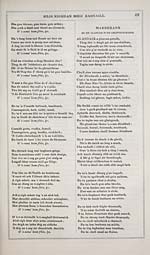Download files
Complete book:
Individual page:
Thumbnail gallery: Grid view | List view

88 - SAR-OBAIR NAM BAUD GAELACH.
SILTS NIGHEAN MHIC RAOr^AILL.
Cicely or Julian M'Don-ald lived from the reign of Charles II. to that of George I.
She was daughter to Mac Raoijhnaill na Ceapach, and of the Roman Catholic persuasion.
Consequently she was an enemy to Protestantism, and hence devoted the earliest efforts
of her muse against the House of Hanover. It is said that in her young daj's she was
very frolicsome. She then composeil epigrams, some of which are very clever, and in
our possession. She was married to a gentleman of the family of Lovat, and lived with
him in Moràyhach Mhic-Shimidh, a place which she describes in a poem, as bare and
barren in comparison to her native Lochaber. This celebrated piece begins with, " A
theanga sin 'sa theanga shroil," which was the first piece she composed after her marriage.
During her residence in the North she composed " Slmi gu brack le ceùl na clàrsaich,"
as a lament for Lachlan M'Kinnon the blind harper. This harper was a great favourite
of our poetess, and used to spend some of his time in her father's family. He was also
in the habit of paying her a yearly visit to the North, and played on his harp while she
sung :—
" Nuair a ghlacadh tu do chlàrsach,
Sa bhiudh tu ga gleusadli lainh rium,
Cha niliath a tliuii^te le umaidli,
Do chuir cLiul-sa,'s mo ghabhail dhan-sa."
I During her residence in the North she composed several short pieces, among which is an
answer to a song by Mr M'Kenzie of Gruineard called " An obair nogha." Her husband
died of a fit of intoxication, while on a visit to Inverness. She composed an elegy on him
which is here given. The song '* Alasdair a Glinne- Garaidh" is truly beautiful, and has
served as a model for many Gaelic songs. After the death of her husband, she was nearly
I cut off by severe illness ; and upon her recovery, engaged her muse in the composition of
hymns, some of which are still in use, as appears from a Hymn-book printed at Inverness
in 1821. She lived to a good old age, but the time of her death is uncertain.
MAR13HIIANN AIIl BAS A FIR.
'S I so bliadhna 's faid' a chlaoidh mi, j 'S i so bliadhn' a chaisg air m' àilleas,
Gu'n cheol gu'n aighear gun fhaoiltfas, I Cliuir mi fear mo thaigbe 'n càradh,
Mi mar bhàt air tràigh air sgaoileadb, i 'N ciste chaoil 's na saoir 'ga sàbhadh ;
Gun stiùir, gun seol, gun ràmh, gun taoman. O ! 's mis tba faoiii "s ino dbaoin' air m' fiiàgail.
O 's coma ham fhln na co dh iuhh sin. ^ '* "'""'' ''"'" /'"'"' e"'-
Mire, no aighear, no iùgradh, ]
'N diugh o shin mi r'a chnnntudh, Cbaill mi sin 's mo chuileaii grddhach,
' S e ceann na hladhna Ihvg riadh dhiom dùbaill. , Bha gu foinnidh, fearail, àillidh.
SILTS NIGHEAN MHIC RAOr^AILL.
Cicely or Julian M'Don-ald lived from the reign of Charles II. to that of George I.
She was daughter to Mac Raoijhnaill na Ceapach, and of the Roman Catholic persuasion.
Consequently she was an enemy to Protestantism, and hence devoted the earliest efforts
of her muse against the House of Hanover. It is said that in her young daj's she was
very frolicsome. She then composeil epigrams, some of which are very clever, and in
our possession. She was married to a gentleman of the family of Lovat, and lived with
him in Moràyhach Mhic-Shimidh, a place which she describes in a poem, as bare and
barren in comparison to her native Lochaber. This celebrated piece begins with, " A
theanga sin 'sa theanga shroil," which was the first piece she composed after her marriage.
During her residence in the North she composed " Slmi gu brack le ceùl na clàrsaich,"
as a lament for Lachlan M'Kinnon the blind harper. This harper was a great favourite
of our poetess, and used to spend some of his time in her father's family. He was also
in the habit of paying her a yearly visit to the North, and played on his harp while she
sung :—
" Nuair a ghlacadh tu do chlàrsach,
Sa bhiudh tu ga gleusadli lainh rium,
Cha niliath a tliuii^te le umaidli,
Do chuir cLiul-sa,'s mo ghabhail dhan-sa."
I During her residence in the North she composed several short pieces, among which is an
answer to a song by Mr M'Kenzie of Gruineard called " An obair nogha." Her husband
died of a fit of intoxication, while on a visit to Inverness. She composed an elegy on him
which is here given. The song '* Alasdair a Glinne- Garaidh" is truly beautiful, and has
served as a model for many Gaelic songs. After the death of her husband, she was nearly
I cut off by severe illness ; and upon her recovery, engaged her muse in the composition of
hymns, some of which are still in use, as appears from a Hymn-book printed at Inverness
in 1821. She lived to a good old age, but the time of her death is uncertain.
MAR13HIIANN AIIl BAS A FIR.
'S I so bliadhna 's faid' a chlaoidh mi, j 'S i so bliadhn' a chaisg air m' àilleas,
Gu'n cheol gu'n aighear gun fhaoiltfas, I Cliuir mi fear mo thaigbe 'n càradh,
Mi mar bhàt air tràigh air sgaoileadb, i 'N ciste chaoil 's na saoir 'ga sàbhadh ;
Gun stiùir, gun seol, gun ràmh, gun taoman. O ! 's mis tba faoiii "s ino dbaoin' air m' fiiàgail.
O 's coma ham fhln na co dh iuhh sin. ^ '* "'""'' ''"'" /'"'"' e"'-
Mire, no aighear, no iùgradh, ]
'N diugh o shin mi r'a chnnntudh, Cbaill mi sin 's mo chuileaii grddhach,
' S e ceann na hladhna Ihvg riadh dhiom dùbaill. , Bha gu foinnidh, fearail, àillidh.
Set display mode to: Large image | Transcription
Images and transcriptions on this page, including medium image downloads, may be used under the Creative Commons Attribution 4.0 International Licence unless otherwise stated. ![]()
| Early Gaelic Book Collections > Hew Morrison Collection > Sar-obair nam bard gaelach, or, The beauties of Gaelic poetry > (136) |
|---|
| Permanent URL | https://digital.nls.uk/76652748 |
|---|
| Description | A selection of items from a collection of 320 volumes and 30 pamphlets of literary and religious works in Scottish Gaelic. From the personal library of Hew Morrison, the first City Librarian of Edinburgh. |
|---|
| Description | Selected items from five 'Special and Named Printed Collections'. Includes books in Gaelic and other Celtic languages, works about the Gaels, their languages, literature, culture and history. |
|---|

